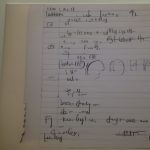6 Ways to Connect with Difficult Material
When prepping for any exam, you’re going to be faced with things you know, things you don’t, and information that is somewhere in between. The things you know aren’t worth the worry. But the rest is another story. That’s why we’ve compiled these 6 Ways to Connect with Difficult Material. Utilize these tactics for your study time, and it won’t matter what exam you have on the horizon, you’ll be more adequately prepared to handle it.
1. Study the same material in two different locations.
[Image via Flickr Creative Commons]
In 2010, The New York Times reported on a study that upended some of what we knew (to that point) about quality study environments. Researchers did a study that found changing up the study environment improved retention of material. In other words, studying for a science test in the comfort of your room one day and then driving to a coffee shop to study the same material on another, increased how well you picked up on the material.
The brain is an unusual tool, and we can’t really tell you why that is, but it appears to be the case. Researchers speculated that the change in environment tends to keep the neurons from getting comfortable, thus working a little harder than they normally would in a standard environment. From our own perspective, we’ve found that to be the case. Some days, we’re firing on all cylinders here at the office, while on other days, a bookstore coffee shop is a nice change of pace.
2. Switch study gears often.
Acknowledging the truth of our first example, it’s a fair assumption to say varying the material that you study also helps you get more from the effort. The brain’s attention span on any one subject runs from around 20 to 30 minutes unless you’re watching a movie. Not sure why that is — multiple characters, constantly changing settings, and plot twists maybe? — but perhaps we can learn something from it.
Instead of treating our studies like a boring lecture series, we should instead develop a study plan of all the material we need to know. Plot the movie version of your studies, so to speak, by pencilling in 30 minutes for Critical Reading practice, 30 minutes for Writing practice, and 30 minutes for math problems (for SAT test takers). Switch gears often, and your mind won’t have the opportunity to get as bored as it does by slaving away at the same materials for three hours.
3. Add a ticking clock.
[Image via Flickr Creative Commons]
A bomb squad technician, who needs to disarm an explosive device, will be forced to make a decision if that bomb is on a ticking clock. Red wire or blue wire, he’s got to cut one of them or several city blocks could have one heck of a bad day. (And if he doesn’t cut one of the wires, he’s dead anyway.)
Treating your studies in the same manner often improves results. You know that if you don’t have a handle on the material, then not taking action is going to blow up in your face. If you put in the right amount of study time, then it may still blow up in your face, but it at least gives you a fighting chance. And most of the time, at least if you watch a lot of action movies, those bomb techs make the right decision because they’ve used the ticking clock to study the circuitry of the bomb and make their best educated decision.
We’ve said all that to say this: set your timer for each grouping of material, and work with the knowledge that when time’s up, it’s time to move on to another section. This will keep your brain on edge and in the proper anticipatory state for assimilating material.
4. Study with someone who gets it.
It has never been a bad idea in the history of standardized tests and classrooms to broaden your study group as long as the right people are involved. Ideally you would like to study with one or two people, who get the material in question and who are going through it at the same time you are. Peers have a better way of relating and helping one another to fill some of the knowledge gaps.
In the same way that running a 40-yard-dash against someone a half-second faster than you will likely improve your time to a personal best, studying with others who are a little ahead of the game can bring you to a level of competence hard to reach on your own. Maybe it’s just our competitive nature, but if it works, why question?
5. Leave time for decompression.
That’s right. We’re telling you that one of the best things you can do for your studies is to not study at all. At least for a period of time after you already have. This gives your brain time to recover. Think about it like you’re working out. From all the rigor and strain you put your body through on a five-mile-run or by running up and down the bleachers at your football stadium 200 times, that’s really not what builds muscle.
For the muscles to grow and strengthen, they need a refractory period — or recovery time — to heal from the damage you’ve done. In the same manner, studying difficult material is necessary in that it introduces concepts, builds familiarity, and stuffs the brain with new information, but without the down time, you would become bogged down, and that temporary understanding you gained from reading a chapter would become a bunch of indiscernible words lost in a sea of raw data. So in other words, watch a couple of episodes of your favorite show even if your exam is just a few days away.
6. Engage in no-hands recall.
At some point, you’ll need to recall new and existing information to edify your overall understanding of a topic. We recommend no-hands recall, because it lets you know what you really picked up on, and also calls attention to concepts that need a little more attention. How you choose to recall information — be it through private journaling or in orally quizzing your study partners and vice versa — is unimportant. What is important is that you let your bicycle of knowledge ride without its training wheels.
Whether you’re a 30-year-old trying to learn Spanish for the first time in his life or a fifth grader trying to learn fractions, the study techniques above can better help you connect with difficult material. And the only things that you need to bring along are your time and attention. What study techniques have helped you to perform better? Share them with us.










